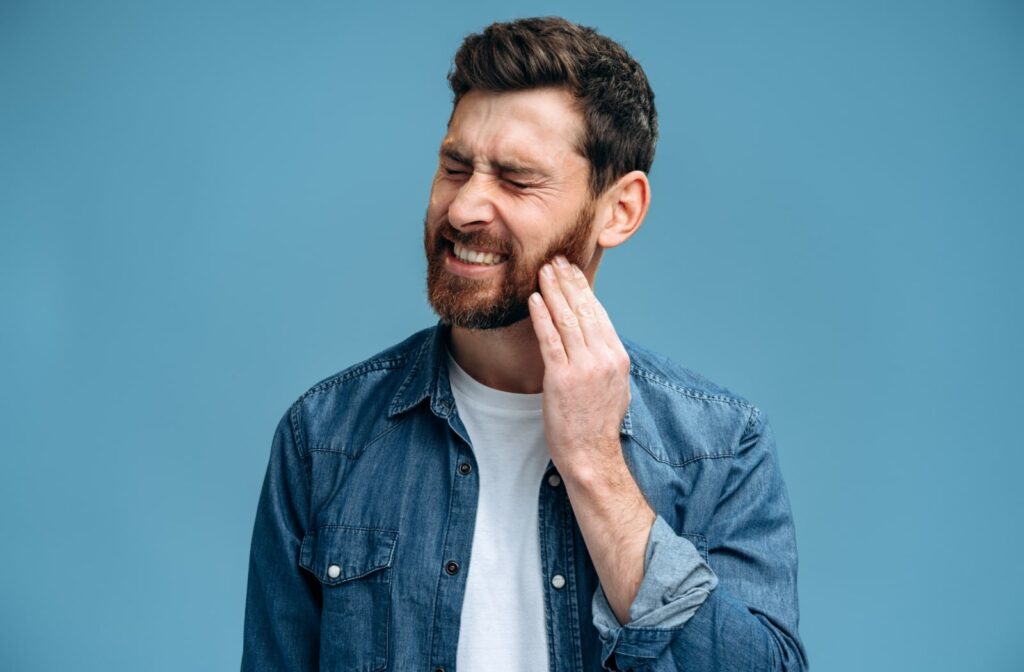Everyone can relate to the feeling of having bad breath. It’s not a very pleasant experience, especially when you’re about to talk to someone or be close to others. If you’re keeping up with oral hygiene, but are still experiencing bad breath, you may be wondering if there may be a different cause, like a cavity.
The bacteria that thrive in cavities can produce an unpleasant odour contributing to bad breath. However, cavities alone don’t directly cause bad breath. Even so, with your dentist’s help, you can address cavities and give bacteria one less place it can hide.
What Are Cavities?
A cavity is a small hole in a tooth that forms due to tooth decay. Tooth decay occurs when plaque builds up on teeth and begins to break down the enamel, the tooth’s protective outer layer. While cavities are more common in childhood, they can affect people of any age. Cavities are incredibly common—about 96% of adults have had a cavity at some point in their life!
Adults typically get 2 kinds of cavities:
- Recurrent cavities, which form around a filling. Fillings disrupt the smoothness of natural teeth, leaving little pockets where food or bacteria can get stuck and start to erode the enamel. Also, your filling could break, exposing the interior to germs.
- Root cavities, which form around the root of the teeth. Brushing your teeth too hard, gum disease, or simply growing older could cause your gums to recede and expose more of the tooth’s root. These roots don’t have the same protective enamel, leaving them open to harmful attacks from bacteria.
An untreated cavity might seem like a minor inconvenience, but it’s actually an open invitation for sneaky bacteria. These microscopic party crashers can infiltrate your tooth and reach the pulp inside. If left unchecked, this can kick off a not-so-fun chain reaction of pain, sensitivity, and possibly even infection.
If this happens, your dentist can help with a root canal treatment or remove the infected tooth and replace it with a shiny new artificial one.
What Causes Bad Breath?
Cavities alone don’t cause bad breath, but they can contribute to it. When you have a cavity, bacteria tend to accumulate in that area and release sulphur compounds that smell like rotten eggs. This odour can then be carried out of your mouth, resulting in bad breath.
But cavities aren’t the only thing that can cause bacteria build-up. Other potential causes of bad breath, also known as halitosis, can include:
- Pungent foods and beverages
- Bacteria on the tongue
- Dry mouth
- Medical conditions, such as sinus infection and postnasal drip
- Gum disease
- Smoking or other tobacco use
Stopping Bad Breath in Its Tracks
Here are some tips you can use to either freshen up your breath or reduce your chances of developing it in the first place:
- Stay hydrated: Drinking plain water can help flush away food particles lingering in your food. Fewer particles mean there are fewer materials for bacteria to grow on.
- Practice good oral hygiene: Brush twice a day to clean out bacteria that can collect in your mouth. And don’t forget about your tongue! You should also floss daily since brushing can miss food particles stuck between your teeth.
- Deal with dry mouth: Chewing sugarless gum could help stimulate saliva and keep your mouth from drying out.
- See your dentist regularly: Your dentist can uncover oral health problems early and help you determine the cause of bad breath.
Remember, the Ontario Dental Hygienists’ Association recommends waiting 1 hour after consuming acidic food or beverages before you brush your teeth. You need to give your saliva some time to neutralize the acids, and brushing too soon could damage your enamel.
How Can I Tell If Cavities Are Causing My Bad Breath?
Visiting your dentist is one of the best ways to determine if a cavity is trapping odour-causing bacteria in your mouth. They can examine your teeth and rule out any other oral health problems that might be causing the bad breath. They can also recommend a treatment plan to address the cavities and help prevent future ones from forming.
Fortunately, many steps for preventing bad breath can also help you stave off cavities. That includes brushing, flossing, and limiting acidic or sugary foods. Your dentist may also recommend a fluoride treatment to help strengthen your teeth.
If you do have a cavity, your dentist will typically treat it by removing the decayed portion of the tooth and filling the hole with a dental filling. This can be done painlessly using local anesthesia, and the filling can be made from various materials, including silver amalgam, composite resin, or porcelain.
Sometimes, if the cavity is severe, your dentist may need to perform a root canal or extract the tooth.
Fresh Breath & Oral Health
Cavities are indeed pesky little troublemakers that can contribute to bad breath, but they’re not the only culprits. By practicing good oral hygiene, keeping sugary and acidic treats in check, and paying regular visits to your dentist, you’re well on your way to keeping cavities and bad breath at bay.
So, why wait? Book your dental cleaning at Upper Gage Dental Centre today and take the first step towards a dazzling smile and fresh breath!



